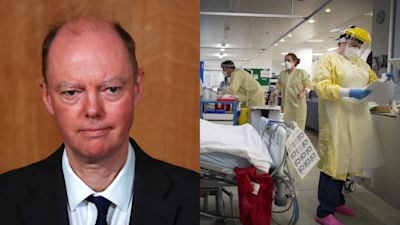Covid 'has not thrown its last surprise at us', warns Chris Whitty

Covid-19 “has not thrown its last surprise at us and there will be several more over the next period”, England’s Chief Medical Officer Professor Chris Whitty has said.
He said he is anticipating that case rates will continue to go up in the next few weeks owing to the Delta variant being “significantly more transmissible” than the Alpha variant.
“In terms of the medium term, my expectation is that we will get a further winter surge, late autumn/winter surge, and that is because we know that winter and autumn favour respiratory viruses, and therefore it’d be very surprising if this particular highly transmissible respiratory virus was not also favoured,” he said.
Prof Whitty, speaking at the NHS Confed Conference, said most people think there will be “further problems over the winter”, adding: “How big they’ll be I think is uncertain, and that partly depends on do we get new variants which can evade vaccines better, and partly depends on how the current wave passes through the UK."
Want to get more analysis and news on the virus? Listen to our podcast:
He said that over the next two or three years, new variants would likely mean revaccinations or booster jabs.
“So, I think we have to just be aware that Covid has not thrown its last surprise at us and there will be several more over the next period.”
Prof Whitty said there was minimal flu last winter but warned it will be back this winter “unless the Covid situation is so bad that everybody has started to go back to essentially minimising their social contacts again”.
He said it probably will not be on the scale of last winter but that the NHS still has to be braced.“I think we need to be aware of and brace for the fact that the coming winter may well be quite a difficult one,” he said.
Covid: Cases doubling every 11 days among the unvaccinated in England, according to scientists
Covid vaccine: Pimlico Plumbers to force staff to have jab and fire those who refuse
Prof Whitty said there are areas of deprivation which have been repeatedly impacted by Covid-19.
“The geographical areas where Covid has hit have been extremely defined, where the biggest problems have been repeated.
“So, you see in situations in Bradford, in Leicester, in bits of London for example, in bits of the north west, you see repeated areas where places have been hit over and over again in areas of deprivation.
“Indeed in many of them, if you had a map of Covid’s biggest effects now and a map of child deaths in 1850, they look remarkably similar.
“These are areas where deprivation has been prolonged and deeply entrenched.”
He said the NHS needs to look at these areas and say “look, whatever happens, it’s going to happen badly here” whether it’s cardiovascular disease, cancer, or new infections.